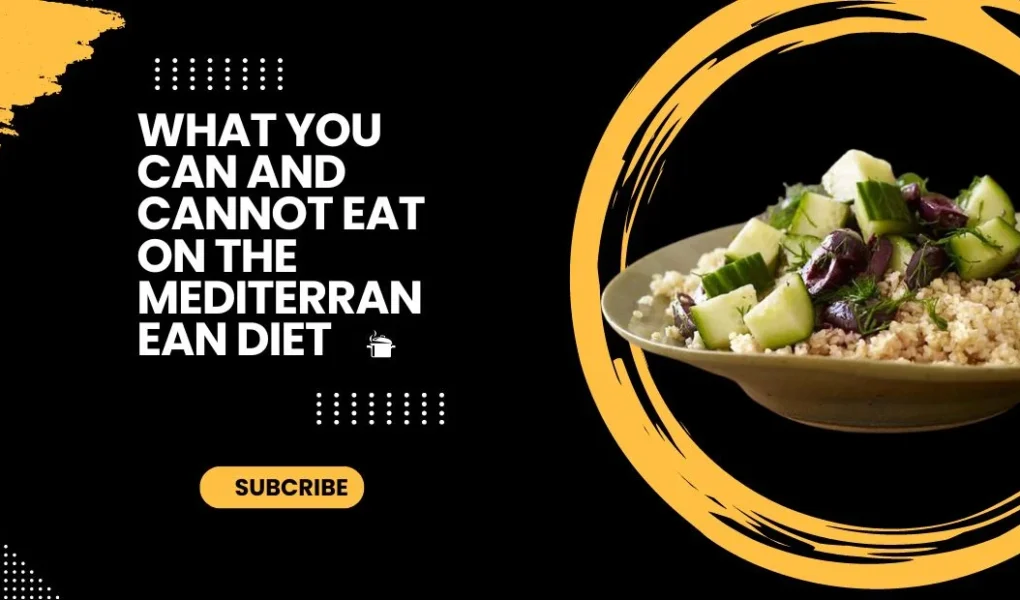The Mediterranean diet is celebrated for its health benefits and delicious flavors, focusing on fresh, nutrient-dense foods inspired by the traditional diets of countries like Greece, Italy, and Spain. Here’s a comprehensive guide on what to include and avoid while following this heart-healthy eating plan.

what you can and cannot eat on mediterranean diet Ingredients
The Mediterranean diet emphasizes:
- Fruits and Vegetables: Load up on colorful fruits and vegetables such as tomatoes, cucumbers, peppers, spinach, kale, and berries. These are rich in vitamins, minerals, and antioxidants.
- Whole Grains: Choose whole grains like whole wheat bread, brown rice, quinoa, and oats. These provide fiber and essential nutrients.
- Healthy Fats: Opt for olive oil as your main fat source, along with nuts, seeds, and avocados. These provide monounsaturated fats that support heart health.
- Lean Proteins: Include fish and seafood (like salmon, sardines, and shrimp) at least twice a week. Poultry, eggs, and dairy (like Greek yogurt and cheese) are also part of the diet.
- Herbs and Spices: Flavor your dishes with herbs like basil, oregano, and mint, and use spices like garlic and cinnamon to add depth without extra salt.
Step-By-Step Instructions
- Fruits and Vegetables: Aim to fill half your plate with a variety of fresh or cooked vegetables and fruits. Enjoy them as snacks or part of main dishes.
- Whole Grains: Replace refined grains with whole grains in your meals. Choose whole wheat pasta, quinoa salads, or brown rice dishes.
- Healthy Fats: Use olive oil for cooking and in salad dressings. Snack on nuts and seeds, and incorporate avocados into sandwiches and salads.
- Lean Proteins: Enjoy fish as your main protein source, grilled or baked with herbs. Include poultry and eggs in moderation, and dairy products like yogurt for calcium.
- Herbs and Spices: Experiment with fresh herbs to enhance flavors without relying on salt. Use garlic, lemon, and other spices to season dishes.
Directions
- What to Eat: Focus on plant-based foods like vegetables, fruits, whole grains, nuts, and seeds. Include seafood, poultry, eggs, and dairy in moderation. Use olive oil and herbs for flavor.
- What to Limit: Reduce red meat consumption to a few times a month. Limit processed foods, refined sugars, and saturated fats like butter and cream.
- What to Avoid: Steer clear of sugary beverages, excessive sweets, and heavily processed snacks. Minimize intake of red meats and fried foods.
Nutrition Facts
The Mediterranean diet is renowned for its balance of nutrients:
- Rich in Antioxidants: Fruits, vegetables, and olive oil provide antioxidants that protect cells from damage.
- Heart-Healthy Fats: Olive oil and nuts supply monounsaturated fats that support heart health.
- Fiber-Rich: Whole grains and legumes are high in fiber, aiding digestion and promoting satiety.
- Lean Proteins: Fish and poultry offer lean protein sources that are essential for muscle health.
Reviews
People who follow the Mediterranean diet often report:
- Improved Heart Health: Lower cholesterol levels and reduced risk of heart disease.
- Weight Management: Sustained weight loss and healthy body composition.
- Increased Energy: Feeling more energized and less fatigued throughout the day.

Community Tips and Praise
- Variety is Key: Enjoy a diverse range of foods to ensure you get all essential nutrients.
- Simple Swaps: Replace butter with olive oil and red meat with fish or beans for healthier options.
- Moderation Matters: Indulge in treats occasionally but maintain balance with nutritious meals.
In conclusion, the Mediterranean diet offers a flavorful and nutritious approach to eating that supports overall health and well-being. By focusing on whole, natural foods and limiting processed items, you can enjoy a diet rich in nutrients and benefits for years to come. Embrace this lifestyle for a healthier heart, improved energy, and delicious meals every day.




